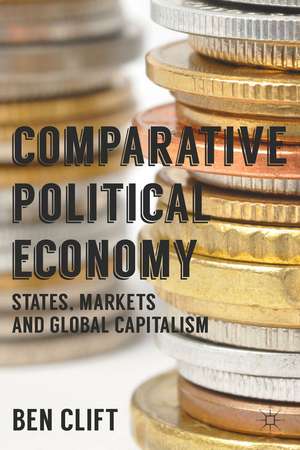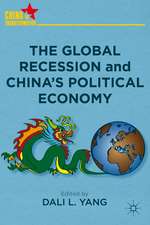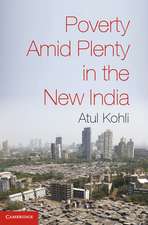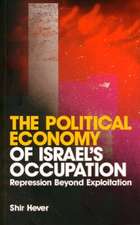Comparative Political Economy: States, Markets and Global Capitalism
Autor Ben Cliften Limba Engleză Paperback – 30 mar 2014
Ben Clift, a leading figure in the field, rethinks the supposed boundaries between comparative and international political economy, highlighting the how disciplines complement each other in an era where economic activity is increasingly shaped by political and social influence. Upper-level undergraduates and postgraduates studying Comparative Political Economy or a subject related to Political Economy will find this book essential. As the topics and disciplinary themes covered by this text are broad, students of more general Politics or International Relations courses will also be well served by this text.
| Toate formatele și edițiile | Preț | Express |
|---|---|---|
| Paperback (2) | 229.17 lei 22-36 zile | +58.88 lei 6-12 zile |
| Bloomsbury Publishing – feb 2021 | 229.17 lei 22-36 zile | +58.88 lei 6-12 zile |
| Macmillan Education UK – 30 mar 2014 | 257.73 lei 22-36 zile | |
| Hardback (1) | 544.48 lei 43-57 zile | |
| Bloomsbury Publishing – feb 2021 | 544.48 lei 43-57 zile |
Preț: 257.73 lei
Preț vechi: 283.65 lei
-9% Nou
Puncte Express: 387
Preț estimativ în valută:
49.33€ • 53.60$ • 41.47£
49.33€ • 53.60$ • 41.47£
Carte disponibilă
Livrare economică 31 martie-14 aprilie
Preluare comenzi: 021 569.72.76
Specificații
ISBN-13: 9780230555174
ISBN-10: 0230555179
Pagini: 392
Dimensiuni: 155 x 235 x 23 mm
Greutate: 0.59 kg
Ediția:2014
Editura: Macmillan Education UK
Colecția Red Globe Press
Locul publicării:London, United Kingdom
ISBN-10: 0230555179
Pagini: 392
Dimensiuni: 155 x 235 x 23 mm
Greutate: 0.59 kg
Ediția:2014
Editura: Macmillan Education UK
Colecția Red Globe Press
Locul publicării:London, United Kingdom
Cuprins
Introduction:
The
Focus
and
Rationale
of
the
Book.-
1.
Comparative
Political
Economy:
Lineages
From
Classical
Political
Economy,
Linkages
To
International
Political
Economy.-
2.
The
CPE
of
Capitalism
&
Classical
Political
Economy.-
3.
Disciplinary
Politics
and
the
Genealogy
of
CPE.-
4.
Institutional
Analysis
and
CPE.-
5.
Interests-Based
Analysis
and
CPE.-
6.
Ideational
Analysis
and
CPE.-
7.
The
CPE
of
the
State.-
8.
Comparative
Capitalisms.-
9.
The
CPE
of
Finance
and
Corporate
Governance.-
10.
The
CPE
of
Welfare.-
11.
The
Comparative
Method
and
CPE.-
Conclusion.
Notă biografică
Ben
Clift is
Professor
of
Political
Economy,
and
an
Associate
Fellow
of
the
Centre
for
the
Study
of
Globalisation
and
Regionalisation,
Warwick
University,
UK.
He
is
also
an
Honorary
Fellow
of
the
Sheffield
Political
Economy
Research
Institute.
Caracteristici
- Major
new
introduction
to
CPE
from
a
leading
figure
in
the
field
- Takes
account
of
recent
developments,
such
as
the
global
financial
crisis,
to
provide
a
fully
up-to-date
account
- Offers
an
original
perspective
on
the
study
of
CPE
and
situates
the
field
within
the
tradition
of
classical
Political
Economy
theorists,
such
as
Smith,
Marx
and
Keynes
Recenzii
This is a superb survey of the field of comparative political economy - including its early origins, development over time, and latest cutting-edge research. In this beautifully written book, Ben Clift manages to create genuine intellectual excitement for both aspiring and established political economists.
Comparative Political Economy is an exceedingly erudite book. Clift navigates deftly between classical political economy theory, rival analytical frameworks, and contemporary economic issues. The discussion of current topics, like the financial crisis and political populism, is especially welcome.
Comparative Political Economy provides us with some essential tools for analysing the dynamism and dysfunctionality of capitalist development in all its various forms. Ben Clift's book offers the best introduction to this approach. It places comparative political economy within the 'classical' tradition of Smith, Marx and List before providing an invaluable critical overview of the cutting-edge of the field today. The book is attentive to history and theory while marshalling an impressive breadth of empirical evidence. It will undoubtedly prove to be a key reference point for the next generation of scholars working within the field.
Ben Clift has written the most comprehensive review of comparative political economy I've seen in many years. Classical and modern debates; interest-based and ideational approaches; diverse methodological perspectives, it's all covered. This is a real gem!
Political economy has been too long divided between different schools and approaches. In this path-breaking text Ben Clift shows the potential of an integrated political economy and how comparative and international political economy can complement one another. This is a book which all students of political economy will benefit from reading.
Ben Clift provides a crisp, cogent and compelling introduction to comparative political economy. Theoretically rich, highly perceptive and packed with telling analytical insights he makes the best possible case for the value of comparative political economy today. A must read.
Ben Clift's Comparative Political Economy: States, Markets and Global Capitalism is a wonderfully readable book that provides a clear, concise, and illuminating introduction to comparative political economy, from the theoretical origins to the contemporary realities. Through its insightful analysis of conceptual debates, empirical applications, and methodological approaches, this book fills a very big gap in the comparative political economy literature, providing a text that 'says it all' in ways that students will find not just accessible but also enjoyable to read, and which scholars will cite. Moreover, by emphasizing the central role of ideas while showing how states and markets are intertwined and how comparative political economy and international political economy are interrelated, the book offers a refreshingly innovative and up-to-date way of understanding comparative political economy today.
Every so often, a book comes along that both demands inclusion on student reading lists and takes scholarly debate forward. Comparative Political Economy is one of those rare volumes. Ben Clift writes with clarity, passion and erudition in defence of a political economy that is methodologically pluralist, historically sensitive and wide ranging in its source literature. The result is a masterpiece of exegesis that will gain countless adherents in the classroom. It will also force us, as scholars, to think very seriously about the substance of our field in general and the supposed boundaries between comparative and international political economy in particular.
Comparative Political Economy is an exceedingly erudite book. Clift navigates deftly between classical political economy theory, rival analytical frameworks, and contemporary economic issues. The discussion of current topics, like the financial crisis and political populism, is especially welcome.
Comparative Political Economy provides us with some essential tools for analysing the dynamism and dysfunctionality of capitalist development in all its various forms. Ben Clift's book offers the best introduction to this approach. It places comparative political economy within the 'classical' tradition of Smith, Marx and List before providing an invaluable critical overview of the cutting-edge of the field today. The book is attentive to history and theory while marshalling an impressive breadth of empirical evidence. It will undoubtedly prove to be a key reference point for the next generation of scholars working within the field.
Ben Clift has written the most comprehensive review of comparative political economy I've seen in many years. Classical and modern debates; interest-based and ideational approaches; diverse methodological perspectives, it's all covered. This is a real gem!
Political economy has been too long divided between different schools and approaches. In this path-breaking text Ben Clift shows the potential of an integrated political economy and how comparative and international political economy can complement one another. This is a book which all students of political economy will benefit from reading.
Ben Clift provides a crisp, cogent and compelling introduction to comparative political economy. Theoretically rich, highly perceptive and packed with telling analytical insights he makes the best possible case for the value of comparative political economy today. A must read.
Ben Clift's Comparative Political Economy: States, Markets and Global Capitalism is a wonderfully readable book that provides a clear, concise, and illuminating introduction to comparative political economy, from the theoretical origins to the contemporary realities. Through its insightful analysis of conceptual debates, empirical applications, and methodological approaches, this book fills a very big gap in the comparative political economy literature, providing a text that 'says it all' in ways that students will find not just accessible but also enjoyable to read, and which scholars will cite. Moreover, by emphasizing the central role of ideas while showing how states and markets are intertwined and how comparative political economy and international political economy are interrelated, the book offers a refreshingly innovative and up-to-date way of understanding comparative political economy today.
Every so often, a book comes along that both demands inclusion on student reading lists and takes scholarly debate forward. Comparative Political Economy is one of those rare volumes. Ben Clift writes with clarity, passion and erudition in defence of a political economy that is methodologically pluralist, historically sensitive and wide ranging in its source literature. The result is a masterpiece of exegesis that will gain countless adherents in the classroom. It will also force us, as scholars, to think very seriously about the substance of our field in general and the supposed boundaries between comparative and international political economy in particular.















